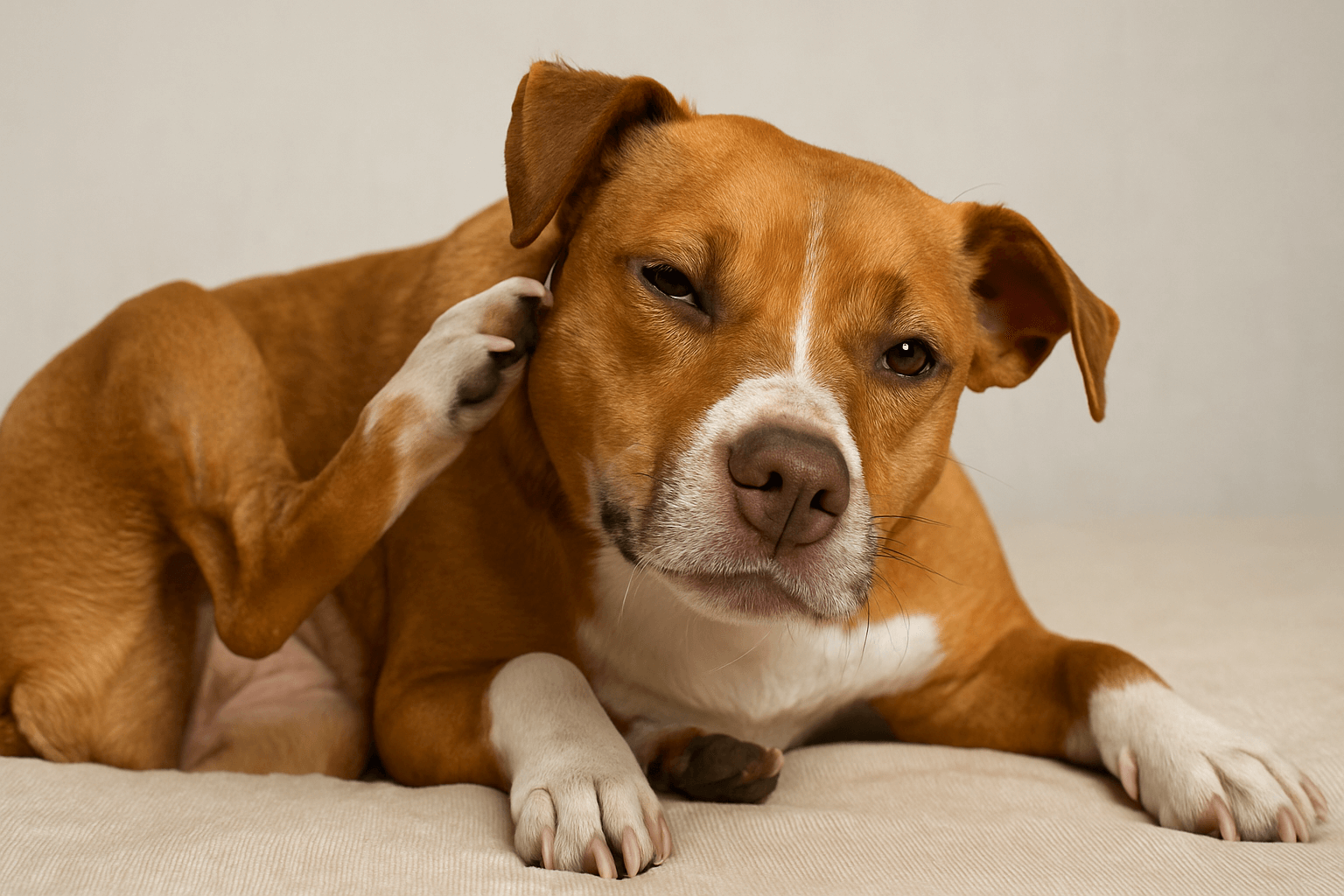If your pup has been scratching more than usual, or you've noticed red patches or flaky spots, you're not alone. Dog skin problems are among the top reasons for vet visits—and understanding what’s going on under your dog’s fur can save you time, money, and most importantly, discomfort for your furry friend.
👀 Signs of Skin Disease in Dogs
Early detection is key. Watch for:
- Persistent scratching or licking
- Redness, bumps, or hot spots on dogs
- Hair loss or bald patches
- Scabs or crusts
- Flaky dog skin (like dandruff)
- Unusual odor or greasy coat
These can be signs of anything from dog dermatitis to a more serious dog skin infection.
🐾 Common Causes of Dog Skin Problems
Skin issues in dogs can stem from multiple sources. Here are the usual suspects:
- Allergies: Environmental (pollen, grass), food, or flea allergies can trigger skin allergies in dogs.
- Parasites: Fleas, mites, and ticks irritate the skin and cause rashes or hot spots.
- Fungal & bacterial infections: Often secondary to scratching or poor hygiene.
- Poor diet: Nutrient deficiencies can lead to dry, flaky skin and a dull coat.
- Underlying health conditions: Hypothyroidism, Cushing’s disease, and autoimmune disorders can affect the skin.
💡 Effective Treatments for Dog Skin Issues
Treatment depends on the root cause, but here are proven ways to bring relief:
1. Vet Diagnosis First
Always start with a vet visit—self-diagnosing can delay proper treatment. They’ll rule out infections or systemic conditions and may run allergy tests.
2. Topical Treatments
- Best shampoo for dog skin issues: Look for medicated or oatmeal-based shampoos. Brands like Vet’s Best or Douxo are often vet-recommended dog skincare.
- Antifungal or antibacterial creams for infections
- Hydrocortisone sprays to reduce inflammation
3. Nutrition & Supplements
- Switch to high-quality, limited-ingredient diets if food allergies are suspected
- Add omega-3 fatty acids to support skin health
- Check out more healthy treats for dogs that support skin & coat
4. Home Remedies for Dog Skin Problems
Sometimes a little kitchen magic helps soothe mild symptoms:
- Oatmeal baths: Natural anti-inflammatory and itch relief
- Coconut oil: Apply topically to moisturize dry patches
- Apple cider vinegar spray: Diluted 50/50 with water for minor yeast infections (never on open wounds)
📘 Case Study: Max’s Itchy Tail
One of my readers, Jenna, wrote in about her golden retriever Max who was chewing at his tail constantly. Turns out, it was a flea allergy combined with dry winter skin. With a vet’s help, a new diet, flea control, and oatmeal baths, Max’s tail is now back to wagging happily.
✅ Prevention Tips
- Groom regularly to remove dirt and allergens
- Use parasite prevention year-round
- Feed a balanced, nutrient-rich diet
- Keep bedding clean and dry
🎯 Final Woof
Your pup’s skin is a window into their overall health. Whether it's a case of itchy skin in dogs or a full-blown dog rash treatment plan, staying informed and proactive makes a huge difference. Trust your instincts—if something seems off, consult your vet.
For more skin-safe tips and wellness advice, sniff out our full dog health blog series!
Frequently Asked Questions (FAQs)
1. What causes itchy skin in dogs?
2. Are hot spots on dogs contagious?
3. What is the best shampoo for dog skin issues?
4. Can I use coconut oil on my dog's skin?
5. How do I know if my dog has skin allergies?
6. When should I see a vet for my dog’s skin problem?

About SniffnTail
SniffnTail is your go-to destination for everything pets. From helpful advice, tips, and insights to thoughtfully selected products and resources, we’re here to support pet owners at every stage of their journey. Whether you're caring for a playful pup, a wise old cat, or anything in between, SniffnTail offers tools and knowledge to make pet parenting easier and more joyful.
Related Articles
 Health & Wellness • 6 minutes
Health & Wellness • 6 minutesThe Link Between Bad Dog Breath and Dental Disease
Discover how bad dog breath is more than a nuisance—it's a sign of potential dog dental disease. Learn symptoms, causes, and what pet parents can do to protect their dog's oral health.
 Health & Wellness • 8 mins Read
Health & Wellness • 8 mins ReadLibrela for Dogs: Complete Guide to Osteoarthritis Pain Relief, Side Effects & Cost
Discover Librela for dogs: your complete guide to canine osteoarthritis pain relief. Learn about its effectiveness, detailed side effects, administration, and how it can improve your dog's mobility. Get expert insights here!
 Health & Wellness • 7 min read
Health & Wellness • 7 min readCanine Arthritis Injections: What Every Dog Parent Should Know
Explore expert insights into canine arthritis injections—an effective dog arthritis treatment. Learn how to help a dog with arthritis, pain relief options, and what meds you can give safely.

